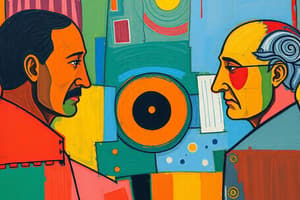Podcast
Questions and Answers
Define the key elements of classical realism.
Define the key elements of classical realism.
Classical Realism is the belief that people and states will act in ways that place interests over ideologies. It states that it is human nature for an endless struggle for power, which explains the essential features of international politics, such as competition and war.
Who is Machiavelli and what is his contribution to political realism?
Who is Machiavelli and what is his contribution to political realism?
Machiavelli, 16th century author of The Prince, wrote that political realism recognizes that principles are lower than politics, and that the ultimate skill of the state leader is to accept and adapt to changing power-political configurations in global politics.
What are the assumptions of classical realism?
What are the assumptions of classical realism?
The assumptions of classical realism are that states are the only actors in international relations that matter, that it is a policymaker's primary responsibility to create and maintain national power, and that no legitimate central authority stands above the state.
What is meant by the 'modern expression' of realism?
What is meant by the 'modern expression' of realism?
What is Neo realism?
What is Neo realism?
Flashcards are hidden until you start studying
Study Notes
Classical Realism
- Classical Realism emphasizes the primacy of interests over ideologies in both individuals and states, reflecting a belief in inherent human nature driving the pursuit of power.
- Competition and conflict, including war, are seen as essential features of international politics grounded in this power struggle.
Machiavelli's Contribution
- Niccolò Machiavelli, a 16th-century writer, presented the idea that political realism prioritizes pragmatic politics over moral principles in his work, "The Prince."
- He argued that successful leaders must be adaptable to evolving power dynamics in global politics.
Key Assumptions
- Classical Realism starts from the premise that states are the primary actors in international relations, overshadowing other entities, such as international organizations or non-state actors.
- Policymakers are charged with the responsibility of safeguarding and enhancing national power.
- There is no overarching authority above the state in the international system, which further emphasizes state sovereignty.
Modern Expressions of Realism
- In contemporary interpretations of realism, the survival of the state is viewed as the foremost responsibility of political leaders.
Neo-Realism
- Neo-realism adopts a scientific approach to international relations, asserting that international power dynamics are characterized by an ongoing struggle for power.
- It highlights the absence of a supreme authority and analyzes the relative distribution of power within the international system, moving beyond the focus on individual states.
Studying That Suits You
Use AI to generate personalized quizzes and flashcards to suit your learning preferences.




